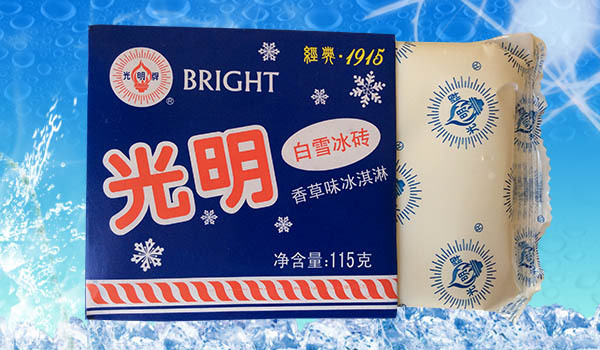Consumers clamor for classic popsicles


One of China's oldest ice cream brands, Bright, refused to increase the price of its signature saltwater and green bean popsicles, saying consumer concerns - that the product is not competitive with foreign brands and is increasingly hard to find - are misplaced.
"We are overwhelmed by consumers' appeals. But since we already had a price increase at the end of last summer and we are doing perfectly well in terms of cost and profit, we won't adjust the price of our products this year," Zhao Jun, general secretary of State-owned Shanghai Yimin No 1 Food Factory, said at a news conference on Wednesday.
A report several weeks ago said the popsicles - a Shanghai classic that's been around for more than half a century - are disappearing from the city's retail landscape. It was followed by several other posts on social media platforms that sparked an outcry among local consumers, who asked the factory to "charge however much it wants" and "bring back their childhood flavors".
"Our products can be found in supermarkets and e-commerce platforms. On the other hand, our popsicles are affordable because that's our responsibility as a State-owned company," Zhao said.
If the product is harder to find, he said, it's likely because the company has not paid extra fees to retailers to induce them to carry it.
By largely replacing human labor with automated ice cream production, he said, the company can survive foreign competition.
The retail price of a saltwater popsicle, for example, is currently 1 yuan ($0.15), up 30 percent since a price adjustment last summer. A carton of 40 popsicles costs about the same as a scoop of ice cream from Haagen-Dazs.
That was the first time the price of the saltwater popsicle had been raised in 17 years.
Founded in 1913, Yimin No 1 Food Factory is one of China's first ice cream makers. Originally a conglomerate that produced beverages, canned foods and snacks, the company began making popsicles in the 1950s under the Bright brand, as the management team at the time believed that only when Chinese people taste the sweetness of their own homegrown ice cream will they have a "bright life".
"We are blessed by the strong attachment of people born in the 1970s and '80s. But for a sustainable business, we need to appeal to a wider and younger clientele across the country," Zhao said.
He added that the company is developing and launching new and more premium products every year to lure younger consumers.
The company has annual sales of several hundred million yuan. Half of its sales come from within Shanghai, while the rest are mostly from neighboring provinces like Jiangsu and Zhejiang.
xujunqian@chinadaily.com.cn
- Nobel laureate Paul Nurse inspires Chinese students in Beijing lecture
- Timothy Fok Tsun-ting awarded honorary doctorate by Renmin University of China
- US kidnapping of Venezuelan president: No high-minded pretense, even an excuse is a cumber!
- No more disinformation on Xinjiang, the law of the jungle fails in here
- CPC calls for reinforced anti-corruption efforts during 15th Five-Year Plan period
- Two ancient chariots unearthed outside Emperor Qinshihuang's Mausoleum





































